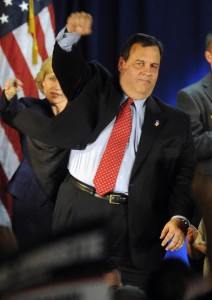A few months ago, I noted how Indiana Governor Mitch Daniels is shaping up to be one of the most impressive stars in the GOP’s 2012 firmament. Though Daniels has gotten some literary love from a wonky contigent of Washington’s columnist corps, he’s never received quite as extensive a profile as in Andrew Ferguson’s cover story in the new Weekly Standard.
The whole (very lengthy) piece is worth reading for its portrait of Daniels as an unpretentious midwesterner, aggresive manager, and possible antidote to the Age of Obama (the piece — coming close on the heels of his PAC’s first high-profile Washington fundraiser — is an obvious attempt to rollout a campaign narrative). Among the nuggets that make a Daniel’s candidacy worth consideration:
He’s quicker on his feet than a garden-variety pol:
We were having lunch one day at a favorite spot, the St. Louis Street Soda Shop in Vincennes, on the Wabash River. Having resisted the Fried Bologna Sandwich ($3.49, with chips, pickle extra), Daniels was washing down a quarter-pound Coney Island dog with a large butterscotch milkshake—“the best in the state,” he assured Dolly, the delighted owner—when a reporter from the local radio station appeared. She pressed him on the education budget cuts too. She told him the local school board had just laid off nine teachers and an administrator.
“What would you say to those people?” she asked.
He visibly flinched, just as he had on MitchTV.
“I’d say it should have been nine administrators and one teacher. There are 20 things that school board could do before it had to lay off one teacher.”
He has an economic record about as sharply in contrast to Obama’s as is imaginable:
When Daniels took office, in 2004, the state faced a $200 million deficit and hadn’t balanced its budget in seven years. Four years later, all outstanding debts had been paid off; after four balanced budgets, the state was running a surplus of $1.3 billion, which has cushioned the blows from a steady decline in revenues caused by the recession. “That’s what saved us when the recession hit,” one official said. “If we didn’t have the cash reserves and the debts paid off, we would have been toast.” The state today is spending roughly the same amount that it was when Daniels took office, largely because he resisted the budget increases other states were indulging in the past decade.
No other state in the Midwest—all of them, like Indiana, dependent on a declining manufacturing sector—can match this record. Venture capital investment in Indiana had lagged at $39 million annually in the first years of this decade. By 2009 it was averaging $94 million. Even now the state has continued to add jobs—7 percent of new U.S. employment has been in Indiana this year, a state with 2 percent of the country’s population. For the first time in 40 years more people are moving into the state than leaving it. Indiana earned its first triple-A bond rating from Standard and Poor’s in 2008; the other two major bond rating agencies concurred in April 2010, making it one of only nine states with this distinction, and one of only two in the Midwest.
And — most astonishingly — he’s such an effective governor that he even got the DMV (actually BMV in the Hoosier State) transformed into a customer-centered operation:
The state Bureau of Motor Vehicles, another patronage sump that was routinely ranked one of the worst in the country, was drastically reorganized. “He likes metrics,” [Indiana OMB Director Ryan] Kitchell said. “He likes to measure outcomes.” Every line item in the state budget has at least one objective formula attached to it to indicate how well each service is being delivered. Regulatory agencies track the speed with which permits and variances are granted. The economic development agency has to compare the hourly wage of each new job brought to the state with the average hourly wage of existing jobs. In the case of the BMV, the two most important metrics were wait times and customer satisfaction. Now each receipt is stamped with the time the customer arrives and the time his transaction is completed. Wait times have dropped from over 40 minutes to under 10 minutes. Surveys put customer satisfaction at 97 percent.
A new generation of reformers is beginning to develop outside of Washington. Dare we hope for a Mitch Daniels/Chris Christie ticket in 2012 (in either order)?


 CFIF Freedom Line Blog RSS Feed
CFIF Freedom Line Blog RSS Feed CFIF on Twitter
CFIF on Twitter CFIF on YouTube
CFIF on YouTube